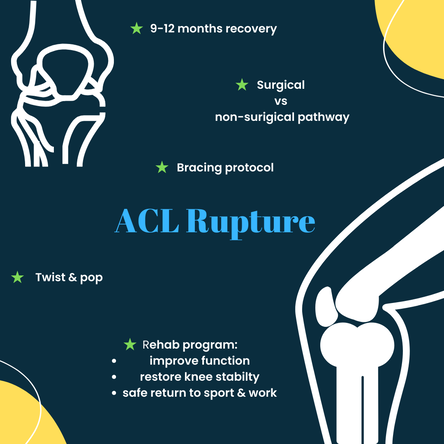 It’s the dreaded feeling - the twist, the pop, the pain and the wobbly knee…. Many people have heard about people rupturing their ACL and the subsequent discussions about surgery, rehab and time off sport (hear.. “season-ending injury“) but do we actually know the best way to get that knee back to normal? The anterior cruciate ligament (ACL) provides stability through the knee connecting the femur (thigh bone) and the tibia (shin bone). It achieves this by preventing the sliding, gliding and rotating of the knee joint. If you tear your ACL your knee may become swollen, painful and feel weak or give way. The goal of any treatment program is to restore knee stability, improve function and for a safe return to sport, work and other activities. In the past we believed that to achieve a good outcome and to get back to pivoting sports (including that social touch footy game), an ACL reconstruction was required. Usually, an MRI, a referral to an orthopaedic surgeon and a physio follow the injury in various orders. And traditionally most active people have undergone an ACL Recon +/- prehab beforehand and a 9-12 month rehab program afterwards. Recent research has demonstrated that this “rule” of most people requiring a recon may need to be rethought…. A new insight into ACL rehab There have been a number of research projects and documented instances of ACLs healing and /or people returning to their previous activities (including Elite sports people) without undergoing an ACL recon and doing Rehab alone. !!! The issue is we don’t really know just from scanning who will respond well to rehab without surgery and those who most likely need surgery. The general consensus is that an initial 3-month Rehab program with or without a bracing protocol (chat to your health provider about this #crossprotocol #richardsonprotocol ) will give your ACL the chance to heal (and quite a % do) and to see if you will cope without the need for surgery. Regardless of surgery or no surgery , you will need to undertake a full comprehensive program over the next 9-12 months and pass the return to sport tests. The best thing is that if surgery IS required, and you’ve done the early work your outcomes after surgery are improved, your muscles will be stronger, you should have good movement, and all the bleeding and swelling will be gone. Now let’s answer some questions about the rehab alone option … Will my knee be “Stuffed” if I don’t get that early surgery? Studies have shown that there is very little difference in outcomes between ACL reconstruction surgery and rehab without surgery. Both treatment options result in similar levels of:
Can I return to sport? About half of all people with an ACL injury will return to the same level of sport, and this is the same whether they choose ACL surgery or rehab without surgery The most common reason people don't return to sport after ACL surgery is a fear of injuring their knee again. ***A successful outcome from rehab without surgery will mean that your knee feels great and you regain full movement and function **** it is not settling for a second-rate option. Unfortunately, some people still have knee instability (knee collapsing or giving way under them) after trialling rehab alone. For these people, there is a risk of damage to other parts of the knee. In this case, surgery is recommended to prevent further knee damage. We have grown up with the notion that ACL recons are the gold standard for getting back to sport and our previous activities. But ... there are always risks associated with any surgery, so if we can avoid unnecessary surgery and still get a good outcome – Is this not the best option? You can always get surgery if you feel your knee is not strong enough… at any time – It is not an emergency. The University of Melbourne has developed this great decision tool to help you get a non- biased opinion and the evidence surrounding the decision to get surgery or to trial rehab. https://www.aclinjurytreatment.com/treatment-options If you have any questions/ comments about your options drop it in the comments or send me a message. *this advice is general and not specific to your injury. For more information or an appointment, including telehealth, contact the practice > [email protected] #TablelandsPhysio #Lithgow #Alliedhealth #ACLrupture #ACLrehab
1 Comment
22/6/2024 01:23:18 am
My favourite part of your blog is the quality of the content that you provide to your readers. I have read all of the descriptions and I have learned many valuable topics about business strategy.
Reply
Leave a Reply. |
Copyright © 2024 All Rights Reserved - TABLELANDS SPORTS & SPINAL PHYSIOTHERAPY
177 Mort Street Lithgow NSW 2790 : Tel: 02 6352 3131 : i[email protected]
Click here to view our Privacy Statement | Click here to take our Customer Satisfaction Survey | Click here to read our Complaints Procedure | Click here to view our Terms & Conditions
177 Mort Street Lithgow NSW 2790 : Tel: 02 6352 3131 : i[email protected]
Click here to view our Privacy Statement | Click here to take our Customer Satisfaction Survey | Click here to read our Complaints Procedure | Click here to view our Terms & Conditions
